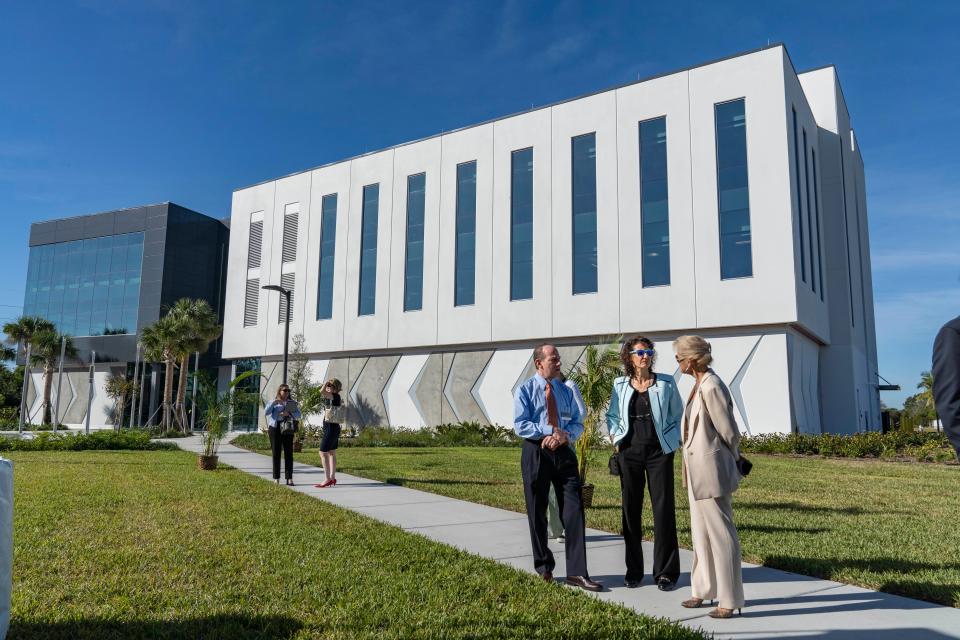FAU brain science center in Jupiter partially reopens; some research faces months of delay
JUPITER — After a four-month closure due to problems with its HVAC system, Florida Atlantic University’s brain research center at its Jupiter campus has partially reopened. However, it will likely be more than six months before work is completed and research can resume there.
The $35 million Stiles-Nicholson Brain Institute was completed in November 2022 and was celebrated with a ribbon cutting in January. It was evacuated and shut down at the end of July. The evacuation occurred after continuing problems with people being unable to open doors within the building and becoming trapped in various rooms.
The institute, on the north side of Donald Ross Road east of Interstate 95, is the workplace of 75 faculty members, students and staff, and people have been steadily moving back in, FAU spokeswoman Cara Perry said on Wednesday, Dec. 13.
The institute’s research is focused on the study of brain disorders, including Alzheimer’s disease, autism, addiction and brain cancer. It is part of a growing biotech cluster along Donald Ross Road that also includes the Max Planck Florida Institute for Neuroscience and the Herbert Wertheim UF Scripps Institute for Biomedical Innovation and Technology.
New FAU president: Already rocked by political intrigue, search must start over
HVAC system at core of problems facing FAU brain institute building in Jupiter

Although administrative use of the building began in the first week of December, a complete reopening is not anticipated until sometime in July. Researchers will be unable to resume their work with mice and rats at the building until then.
Perry explained in an email that the heating, ventilation and air-conditioning system was creating periodic, intermittent periods of pressure change inside the building, which made it difficult to open the exterior doors.
“As a result, ventilation throughout the research-related spaces in the building needs adjustment, and this phase of work will take additional time,” Perry said. “Meanwhile, researchers are continuing their work in the interim spaces they have been operating in since the temporary closure.”
Story, windy weather: Striking images show this week's conditions throughout Palm Beach County
Wendy Ash Graves, FAU’s director of environmental health and safety, said in a late November internal email that work will continue, but that she was pleased to report that the building’s safety concerns have been permanently resolved.
“The return of all building operations is anticipated based on the lead times of critical equipment and systems based on three phases,” Graves said.
Randy Blakely, the institute's executive director, praised his scientists for showing resiliency when forced to leave the building during the summer. Most worked in other lab space on the FAU campus, he said.
The main loss in having to relocate is "in access to growth space for recruitment until we return, though we are back advertising and recruiting new students to existing labs," he said.
The institute has relaunched its seminar series and plans to host its fifth Brainy Days, a monthlong celebration of its neuroscience, in March, Blakely said.
Palm Beach County schools: District falls to 'B' rating, but 60 schools get 'A' grades
Animals still weeks from returning to Stiles-Nicholson Brain Institute
Phase 1, allowing the re-occupancy of the building for administrative purposes including meetings and events, is complete. Phase II has begun, and its completion will permit research to be conducted in the building. Phase III is being conducted at the same time as Phase II, and when it is complete, the animals will be re-introduced into the vivarium, Graves said.
The 70 rats and mice were relocated to other vivarium, a complex space designed for the care and maintenance of experimental animals, in Jupiter and Boca Raton.
Graves said efforts will be made to shorten the timeframe of the work to allow both research and animals to return earlier.
“Our engineering team has been working diligently on restoring building operations within MC-22 (the institute’s building number). We greatly appreciate everyone’s patience and professionalism during this very challenging time,” Graves wrote.
Palm Beach County dining: Best restaurants for Christmas Eve, Christmas dining
Graves and FAU public affairs director Peter Hull did not respond to questions about what the repairs will cost and who is paying for them.
Perry said final evaluation of cost has not been completed. Contractors and multiple engineering firms have been working to fix the issues. Under state law, university construction is not inspected by local municipalities, but by in-house university inspectors.
The three-story, 58,000-square-foot building at FAU’s John D. MacArthur campus in Jupiter was in use for a couple of months before its January ribbon-cutting. The institute was founded in 2016 at the Jupiter campus but lacked its own building.
The Florida Legislature paid for the construction, and David J.S. Nicholson donated $10 million for research and education. Nicholson, a philanthropist and wealth manager, formed the Stiles-Nicholson Foundation in 1992.
This article originally appeared on Palm Beach Post: Brain science center partially reopens at FAU-Jupiter after shutdown

